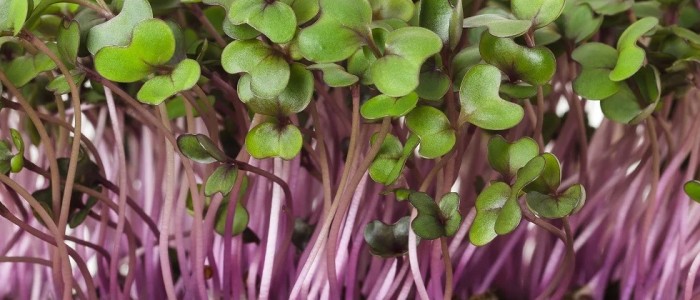-
 Turf Grass Seed Bluegrass, Bentgrass, Ryegrass, Fescues...
Turf Grass Seed Bluegrass, Bentgrass, Ryegrass, Fescues...
-
 Forage Seed Bromes, Clovers, Fescue, Wheatgrass, Legumes
Forage Seed Bromes, Clovers, Fescue, Wheatgrass, Legumes
-
 Grains Wheat Grain, Rye Grain
Grains Wheat Grain, Rye Grain
-
 Cover Crop Seed Buckwheat, Clover, Peas, Ryegrain
Cover Crop Seed Buckwheat, Clover, Peas, Ryegrain
-
 Wildflower Seed Mixtures, Singles, Annual, Perennial
Wildflower Seed Mixtures, Singles, Annual, Perennial
-
 Sprouting Seeds Fully certified Non-GMO Organic seeds for sprouts or microgreens
Sprouting Seeds Fully certified Non-GMO Organic seeds for sprouts or microgreens
Red Acre Cabbage Non-GMO Sprouting Seeds
Red Acre Cabbage (also referred to as Bok Choy) is a colorful and crunchy sweet cabbage belonging to the Brassicaceae oleracea family. It can be grown as sprouts or as traditional cabbage. Delicious raw or cooked.
Seeding Rate:
Indoor: 1 oz./ 10” x 20” tray
Outdoor: 5 oz./ per acre
How to Grow Indoors: Moisten seeds before planting (soaking is not required). If grown indoors, germinate in darkness for at least two days (until germinated). Sow 2-3 seeds per inch in moist potting soil at a depth of 1/4” — at temperatures 60°F to 70°F in full sun (or under grow lights). Keep the soil moist, but allow it to drain. Fertilize every 7-10 days with liquid fertilizer diluted to 25% strength. Harvest when the seedlings are about 6-8” tall (about 9-14 days).
Outdoors: Start in spring when soil temperature is at least 55°F. Sow 2-3 seeds every 12-18” in rows spaced 18-24”. After emergence, thin to strongest seedling per space. Fertilize regularly. Harvest when heads reach 5-7” in diameter (approx. 90 to 110 days). Place un-rinsed cabbage head in a sealed plastic bag and store in a refrigerator (for up to two months). Cutting will release vitamin C and cause the head to deteriorate faster.
Nutritional Value: Sprouting seeds are richer in protein, folate, magnesium, phosphorus, manganese and vitamins C and K than un-sprouted plants. The vitamin and mineral content varies based on the variety of the sprouting seeds. Sprouts offer a powerful source of vitamins, minerals, antioxidants, and enzymes that fight free radicals because sprouting can increase their potency by 20 times or more.

